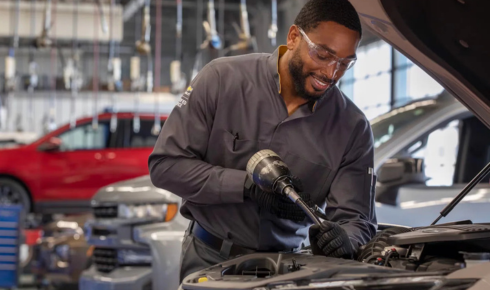Key Takeaways
- Regular maintenance and seasonal check-ups help prolong your vehicle’s lifespan.
- Knowing when to seek professional help can save you from expensive repairs.
- Basic DIY car care boosts safety and performance on the road.
Why Routine Maintenance Matters
Preventative care is the backbone of vehicle reliability, not only extending the life of your car but also protecting your investment over time. For most drivers, regular oil changes, air filter replacements, and routine vehicle inspections can be easily overlooked amid a busy schedule. Yet, taking the time for essential maintenance can stave off serious issues like engine failure, poor braking, and even electrical malfunctions. Neglecting scheduled services makes vehicles more susceptible to wear and tear, leading to expensive and inconvenient breakdowns that could have been easily prevented. When it comes to trucks or heavy-duty vehicles, the stakes can be even higher. Making time for truck repair Lynnwood, or equivalent professional services, ensures these hardworking vehicles are not only safe but also capable of handling demanding jobs all year long.
Numerous industry studies highlight that well-maintained cars retain their value more effectively and require fewer emergency repairs. In fact, according to automotive industry research, drivers who adhere to manufacturer-recommended service schedules can save a significant amount of money on repairs over the lifetime of their vehicle. Even simple steps, such as keeping a log of services and receipts, can help drivers track their progress and anticipate when future work will be required.
Quick Checks Every Car Owner Can Do
You don’t need a toolbox complete with specialty tools or an advanced mechanical background to spot signs of trouble early. Integrating quick visual and auditory checks into your monthly routine, or before taking off on a weekend getaway, can help catch minor issues before they morph into huge expenses. For starters, always ensure that all your vehicle’s exterior and interior lights—headlights, taillights, brake lights, and turn signals—are functioning correctly to stay visible and safe, especially in adverse weather or at night.
- Lights: Briefly activate all light functions and walk around your car to check visibility. Dim or flickering bulbs may indicate electrical issues or simply require a bulb replacement.
- Belts and hoses: Pop the hood and visually inspect serpentine belts and coolant hoses for cracks or wear. Belts and hoses are crucial for engine performance, and failures in these components can leave you stranded.
- Windshield wipers: Run your wipers and spray windshield fluid to see if the blades clear the glass completely. Smearing and skipping usually mean it’s time for a change.
- Noises: Pay attention to new noises when you start the engine and while driving, like grinding, squeaking, or rattling. These often precede bigger failures if ignored.
- Leaks: Check underneath your parking spot for signs of leaking oil, coolant, or brake fluid. Dark spots or puddles may indicate a slow leak or a more significant underlying issue.
Making these inspections a habit truly transforms how you interact with your vehicle. Many drivers pair monthly checks with tasks like refueling or cleaning, making it part of their car care rhythm. Early detection helps you act before minor nuisances escalate into major hassles, saving both time and money.
Understanding and Monitoring Fluid Levels
Your car’s various fluids serve as critical lifelines, keeping the engine, brakes, and other vital systems operating efficiently. Routine monitoring helps avoid mechanical trouble and prolongs the performance of essential components. The key fluids to focus on include:
- Engine Oil: Lubricates moving parts. Dirty or low oil can cause overheating or irreversible engine damage.
- Coolant: Keeps your engine operating within a safe temperature range and protects it from overheating or freezing.
- Brake Fluid: Vital for responsive braking. Low or old brake fluid can result in sluggish or failing brakes.
- Power Steering Fluid: Ensures smooth, responsive steering, particularly at low speeds or when maneuvering in tight spaces, such as parking.
- Transmission Fluid: Provides lubrication and smooth shifting for both automatic and manual transmissions.
- Windshield Washer Fluid: Keeps your view unobstructed in all weather conditions.
Most car manuals lay out clear instructions on how to check and refill these fluids. Many modern cars have dashboard indicators that alert you when a fluid level is low or when it is due for replacement. If you’re unsure which type of oil or coolant to use, consult the owner’s manual or ask a professional; using the wrong fluid can lead to costly problems. Keeping all fluids topped up and clean is a simple action that maximizes performance and prevents major breakdowns.
Tire Care Throughout the Seasons
Tire safety is one of the most critical aspects of car maintenance, but it’s often overlooked until a problem arises. Temperature swings, especially in regions with distinct seasons, can significantly impact tire pressure and tread condition. In winter, cold air decreases tire pressure, causing tires to wear out more quickly and reducing grip on icy roads. Conversely, high summer heat can cause overinflation and increase the risk of blowouts.
According to the National Highway Traffic Safety Administration, more than 700 fatalities occur each year due to tire issues, underscoring the importance of regular tire checks. To keep your tires in peak condition, inspect tread depth using the penny test, and look for signs of balding or uneven wear. Schedule tire rotations approximately every 5,000 to 7,000 miles to promote even tread wear and prolong tire life. Also, check for punctures, sidewall bulges, or slow leaks, especially after driving on rough roads. Proper tire maintenance not only protects your safety but also improves your car’s fuel economy and handling.
Knowing the Warning Signs
Not all vehicle issues are apparent, but your car will often signal trouble before a breakdown occurs. A glowing “check engine” light, for example, could point to issues ranging from a minor sensor problem to a more serious engine malfunction. Other common warning signs include unusual odors (such as burning rubber or sweet syrup), smoke emanating from under the hood, steering wheel vibration, or new squeals and rattles during startup or while driving. As highlighted in CBS News’ coverage on Angie’s List, recognizing these early warning signs can help prevent further damage and protect your safety on the road.
Ignoring these signs can turn easy fixes into expensive repairs or worse, compromise your safety. Trust your instincts: if your car feels, sounds, or even smells differently than usual, it’s wise to consult a professional technician. Even seemingly minor changes, such as a new vibration after hitting a pothole, deserve attention. Acting quickly ensures that problems can be diagnosed and repaired before they escalate to critical failures.
Technology’s Role in Car Maintenance
Today’s vehicles are increasingly reliant on technology to monitor internal systems and alert drivers to maintenance needs. Modern dashboards display real-time updates on everything from oil life to tire pressure and battery voltage. When used and interpreted correctly, these tools offer an added layer of protection and convenience.
Beyond what’s built into your vehicle, dozens of mobile apps are available to help manage maintenance schedules, remind you about upcoming services, and even store your vehicle’s maintenance history. Embracing these technological advancements is one way to ensure no maintenance task is forgotten. Relying on digital tools and embedded sensor alerts empowers drivers to make informed decisions and dramatically extends vehicle lifespan. By coupling traditional care routines with modern technology, drivers can significantly reduce unexpected mechanical problems.
How to Find a Reliable Mechanic
Having a mechanic you trust can make a world of difference when your car needs more than a simple fix. Select a shop with certifications such as ASE (Automotive Service Excellence), which indicates that the technicians have undergone rigorous professional training. While recommendations from friends and family are helpful, don’t underestimate the value of reading reviews and researching each shop’s reputation for transparency and customer service.
- Experience: A seasoned and certified mechanic brings peace of mind during stressful repairs.
- Communication: Good communicators break down the repair process and help you understand what’s necessary versus optional.
- Written estimates: Request a detailed, written breakdown of the work to be performed to prevent misunderstandings.
- Reputation: Look for shops with an excellent record for honesty and reliability in your local online forums or review sites.
Ultimately, building an ongoing relationship with your mechanic or service center enables them to better understand your car’s history and recurring needs. This familiarity leads to more accurate diagnostics, cost-effective maintenance, and trust-based advice when larger repairs arise.
Final Tips for Year-Round Vehicle Health
Small, steady efforts make all the difference when it comes to long-term vehicle care. Keeping diligent records—whether in a notebook, folder, or digital app—ensures you never miss an essential service or recall notice. These records are also valuable for resale, as they add transparency and prove that your car has been well-maintained.
It’s also essential to tailor your routine for the time of year. In cold weather, focus on your battery, heating system, and tire pressure. When the mercury rises, prioritize checking your cooling system and air conditioning. Rotate tires, replace wipers, and listen for new noises at every season’s change. Prevention will always outshine emergency repairs in cost, safety, and stress. Stay proactive, listen to your vehicle’s signals, and you’ll be rewarded with a car that runs reliably and efficiently all year long.


